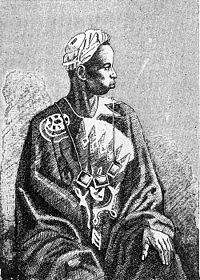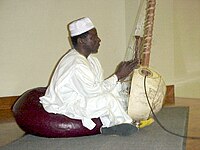|
Griot
  A griot (/ˈɡriːoʊ/; French: [ɡʁi.o]; Manding: jali or jeli (in N'Ko: ߖߋ߬ߟߌ,[1] djeli or djéli in French spelling); also spelt Djali; Serer: kevel or kewel / okawul; Wolof: gewel) is a West African historian, storyteller, praise singer, poet, and/or musician. Instead of writing history books, oral historians tell stories of the past that they have memorized. Sometimes there are families of historians, and the oral histories are passed down from one generation to the next. Telling a story out loud allows the speaker to use poetic and musical conventions that entertain an audience. This has contributed to many oral histories surviving for hundreds of years without being written down. The griot is a repository of oral tradition and is often seen as a leader due to their position as an advisor to members of the royal family. As a result of the former of these two functions, they are sometimes called bards. They also act as mediators in disputes. Etymology and terminologyThe word may derive from the French transliteration "guiriot" of the Portuguese word "criado", or the masculine singular term for "servant." Griots are more predominant in the northern portions of West Africa.[2] In African languages, griots are referred to by a number of names: ߖߋ߬ߟߌ jèli[3] in northern Mande areas, jali in southern Mande areas, guewel in Wolof, kevel or kewel or okawul in Serer,[4][5] gawlo 𞤺𞤢𞤱𞤤𞤮 in Pulaar (Fula), iggawen in Hassaniyan[citation needed], arokin in Yoruba,[citation needed] and diari or gesere in Soninke.[6] Some of these may derive from Arabic قَول qawl- a saying, statement.[citation needed] The Manding term ߖߋߟߌߦߊ jeliya (meaning "musicianhood") sometimes refers to the knowledge of griots, indicating the hereditary nature of the class. Jali comes from the root word ߖߊߟߌ jali or djali (blood). This is also the title given to griots in regions within the former Mali Empire. Though the term "griot" is more common in English, some, such as poet Bakari Sumano, prefer the term jeli.[citation needed] Today, the term and spelling "djali" is often preferred, as noted by American poet Amiri Baraka[7] and Congolese filmmaker Balufu Bakupa-Kanyinda.[8][9] RoleHistorically, Griots form an endogamous professionally specialised group or caste,[10] meaning that most of them only marry fellow griots, and pass on the storytelling tradition down the family line. In the past, a family of griots would accompany a family of kings or emperors, who were superior in status to the griots. All kings had griots, and all griots had kings, and most villages also had their own griot. A village griot would relate stories of topics including births, deaths, marriages, battles, hunts, affairs, and other life events.[11] Griots have the main responsibility for keeping stories of the individual tribes and families alive in the oral tradition, with the narrative accompanied by a musical instrument. They are an essential part of many West African events such as weddings, where they sing and share family history of the bride and groom. It is also their role to settle disputes and act as mediator in case of conflicts. Respect for and familiarity with the griot meant that they could approach both parties without being attacked, and initiate peace negotiations between the hostile parties.[12] Francis Bebey writes about the griot in African Music, A People's Art:[13]
In the Mali Empire The Mali Empire (Malinke Empire), at its height in the middle of the 14th century, extended from central Africa (today's Chad and Niger) to West Africa (today's Mali, Burkina Faso and Senegal). The empire was founded by Sundiata Keita, whose exploits remain celebrated in Mali today. In the Epic of Sundiata, Naré Maghann Konaté offered his son Sundiata Keita a griot, Balla Fasséké, to advise him in his reign. Balla Fasséké is considered the founder of the Kouyaté line of griots that exists to this day. Each aristocratic family of griots accompanied a higher-ranked family of warrior-kings or emperors, called jatigi. In traditional culture, no griot can be without a jatigi, and no jatigi can be without a griot. However, the jatigi can loan his griot to another jatigi. In Mande societyIn many Mande societies, the jeli was a historian, advisor, arbitrator, praise singer (patronage), and storyteller. They essentially served as history books, preserving ancient stories and traditions through song. Their tradition was passed down through generations. The name jeli means "blood" in Manika language. They were believed to have deep connections to spiritual, social, or political powers. Speech was believed to have power in its capacity to recreate history and relationships. Despite the authority of griots and the perceived power of their songs, griots are not treated as positively in West Africa as may be assumed. Thomas A. Hale wrote, "Another [reason for ambivalence towards griots] is an ancient tradition that marks them as a separate people categorized all too simplistically as members of a 'caste', a term that has come under increasing attack as a distortion of the social structure in the region. In the worst case, that difference meant burial for griots in trees rather than in the ground in order to avoid polluting the earth (Conrad and Frank 1995:4-7). Although these traditions are changing, griots and people of griot heritage still find it difficult to marry outside of their social group."[14] This discrimination is now deemed illegal.[by whom?] Musical instruments used by griotsIn addition to being singers and social commentators, griots are often skilled instrumentalists. Their instruments include stringed instruments like the kora, the khalam (or xalam), the ngoni, the kontigi, and the goje (or n'ko in the Mandinka language). Other instruments include the balafon, and the junjung. The kora is a long-necked lute-like instrument with 21 strings. The xalam is a variation of the kora, and usually consists of fewer than five strings. Both have gourd bodies that act as resonator. The ngoni is also similar to these two instruments, with five or six strings. The balafon is a wooden xylophone, while the goje is a stringed instrument played with a bow, much like a fiddle. According to the Encyclopædia Britannica: "West African plucked lutes such as the konting, khalam, and the nkoni (which was noted by Ibn Baṭṭūṭah in 1353) may have originated in ancient Egypt. The khalam is claimed to be the ancestor of the banjo. Another long-necked lute is the ramkie of South Africa."[15] Griots also wrote stories that children enjoyed listening to. These stories were passed down to their children.
Present-day griotsMany griots today live in many parts of West Africa and are present among the Mande peoples (Mandinka or Malinké, Bambara, Bwaba, Bobo, Dyula,Soninke etc.), Fulɓe (Fula), Hausa, Songhai, Tukulóor, Wolof, Serer,[4][5] Mossi, Dagomba, Mauritanian Arabs[citation needed], and many other smaller groups. There are other griots who have left their home country for another such as the United States or France and still maintain their role as a griot. Today, performing is one of the most common functions of a griot. Their range of exposure has widened, and many griots now travel internationally to sing and play the kora or other instruments. Bakari Sumano, head of the Association of Bamako Griots in Mali from 1994 to 2003, was an internationally known advocate for the significance of the griot in West African society. Pape Demba "Paco" Samb, a Senegalese griot of Wolof ancestry, is based in Delaware and performs in the United States.[16] Circa 2013, he performed in charity concerts for SOS Children's Villages in Chicago. As of 2023, Paco leads McDaniel College's Student African Drum Ensemble.[17][18][19][20] His own band is titled the Super Ngewel Emsemble.[18] Concerning the goals of modern-day griot, Paco has stated:
Malian novelist Massa Makan Diabaté was a descendant and critic of the griot tradition. Though Diabaté argued that griots "no longer exist" in the classic sense, he believed the tradition could be salvaged through literature. His fiction and plays blend traditional Mandinka storytelling and idiom with Western literary forms.[21] Notable griots  Burkina FasoCôte d'IvoireGambia
Ghana
Guinea
Guinea Bissau
Mali
MauritaniaNigeriaNigerSenegalSee alsoReferences
Further reading
External links
|


